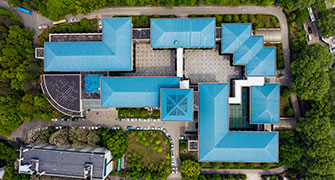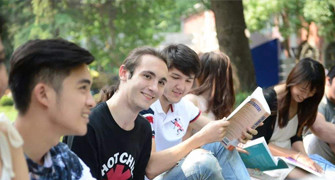
| WANG, Lei |
Professor |
Institute of Economics, Central China Development Research Institute |
Email: leiwang@whu.edu.cn |
Phone: 86-027-68753027 |
PhD, Urban Planning, Columbia University, USA (2003-2009) |
M.A, Regional Economics, Wuhan University, China (1999-2002) |
A.A., Urban Planning, Wuhan University, China (1995-1999) |
|
TEACHING AND RESEARCH AREAS
Research Areas: Urban spatial structure, regional economic development, China economic reform
ACADEMIC EXPERIENCE
2022.09-present Institute of Economics, Wuhan University, Professor
2018.06-present Central China Development Research Institute (Institute of Regional and Urban and Rural Development), Wuhan University, Vice Dean
2017.06-present Central China Development Research Institute, Wuhan University, Vice Dean
2016.11-present Central China Development Research Institute, Wuhan University, Professor
2010.11-2016.11 Central China Development Research Institute, Wuhan University, Associate Professor
2009.7-2010.11 Central China Development Research Institute, Wuhan University, Lecturer
INTERNATIONAL EXPERIENCE
MANAGERAL AND PRACTICAL EXPERIENCE
CONSULTING AND TRAINING EXPERIENCE (GOVERNMENT OR CORPORATE)
SELECTED PUBLICATIONS
Journal Papers (International)
Li, X. &Wang, L.*, 2022. Does administrative division adjustment promote low-carbon city development? Empirical evidence from the “Revoke County to Urban District” in China.Environmental Science and Pollution Research. https://doi.org/10.1007/s11356-022-22653-1
Li, Z., Chen, X. &Wang, L., 2022.A tale of two recoveries: uncovering the imbalance between state-driven production and private consumption in post-pandemic Wuhan, China.Cambridge Journal of Regions, Economy and Society, 15(3).
Wang, L., Li, Z. & Zhang, Z. 2022. City profile: Wuhan 2004-2020.Cities, 123,103585.
Wang, X., Yeung, G., Li, X., &Wang, L.* 2022. Does inter-regional investment by publicly listed companies promote local green total factor productivity? A study of the mediation effects of green patents in China.Journal of Cleaner Production,339(10), 130582.
Wang, X.,Wang, L., Zhang, X., & Fan, F. 2022. The spatiotemporal evolution of COVID-19 in China and its impact on urban economic resilience.China Economic Review,74, 101806.
Wang, L., Yang, W., Zhang, X., Song, Y. & Zhang, Y. 2021. Re-shaping global-ness by spending overseas: Analysis of emerging Chinese consumption abroad.Cities, 109:1-10.
Wang, X.,Wang, L., Wang, S., Fan, F., & Ye, X. 2021. Marketisation as a channel of international technology diffusion and green total factor productivity: Research on the spillover effect from China’s first-tier cities.Technology Analysis & Strategic Management,33(5), 491-504.
Wang, L.& Sarker, P. 2020. Analyzing urban sprawl and sustainable development in Dhaka, Bangladesh.Journal of Economics and Sustainable Development, 11(6): 11-20.
Wang,L.2016. The Singapore water story: Sustainable development in an urban city state.Urban Studies, 53(12): 2675~2677.
Li, Z., Li,X. &Wang, L.2014.Speculative urbanism and the making of university towns in China: A case of Guangzhou University Town. Habitat International, 44: 422-431.
Wang, L.2014. Forging growth by governing the market in reform-era urban China.Cities, 41: 187~193
Wang, L., Potter, C.& Li, Z. 2014. Crisis-induced reform, state-market relations, and entrepreneurial urban growth in China.Habitat International, 41: 50-57.
Journal Papers (Domestic)
Wang Lei, Li Fengbo, Ma Xinyu, 2022, The Riddle of China's North-South gap: Structural transformation and structural impact based on a spatial econometric model, Journal of Yunnan University of Finance and Economics, 5 (5), 1-15
Wang Lei, Li Fengbo, Wang Xuili, 2022, Can remote exchanges between local officials reduce urban carbon emissions? Based on micro-data of remote exchanges between mayors and Party secretaries, Journal of Shanxi University of Finance and Economics, No. 1, 14-27
Wang Lei, Li Jinlei, 2021, Industrial structure upgrading effect of regional coordinated development: a quasi-natural experiment based on the Beijing-Tianjin-Hebei coordinated development Policy, Journal of Capital University of Economics and Business, 4, 39-50
Wang Lei, Yang Wenyi, 2021, Cultural differences, consumption functions and intercity consumption mobility: Based on China UnionPay big Data analysis, Journal of Wuhan University (Philosophy and Social Sciences Edition), 2, 102-118
Wang Lei, Wang Xueli, Yang Wenyi, Wang Song, Will car-sharing reduce air smog in 2021?——Based on Didi Chuxing Big Data, China's Population, Resources and Environment, No. 1, pp. 145-155
Wang Lei, Li Anqi, Yang Wenyi, Zhang Yina, 2019, Spatial pattern and driving factors of intercity real estate consumption flow: A case study of urban agglomeration in the middle reaches of the Yangtze River, Hubei Social Sciences, 12, pp. 46-55
Wang Lei, 2019, Focusing on Improving the regional spatial governance system, National Governance, 10 (10), 41
Wang Lei, Yang Wenyi, Zhang Yina, 2019, the boundary effect of intercity consumption flows: A case study of urban agglomeration in the middle reaches of the Yangtze River, Finance and Trade Economics, 7, pp. 127-142
Wang Lei, Gao Miaomiao, 2019, Spatial characteristics of tourism economy in urban agglomerations in the middle reaches of the Yangtze River -- Based on the perspective of social network analysis, Academic Research, 4, pp. 43-48
Wang Lei, Yang Wenyi, Zhang Yina, 2019. A study on the network system of urban agglomerations in the middle reaches of the Yangtze River based on consumption flow, Urban Development Research, 1, pp. 101-109
Wang Lei, Gao Qian, 2018. The impact of spatial structure on economic performance of urban agglomerations in the middle reaches of the Yangtze River, Human Geography, 6 (in Chinese), 96-102
Wang Lei, Li Chengli, Growth effects of polycentric urban agglomerations in central China, 2018. Resources and Environment in the Yangtze Basin, 10, 2231-2240
Wang Lei, Sun Xiaoge, 2018, Environmental pollution emission of Central Plains urban agglomeration based on 3D framework, Regional Research and Development, 2, pp. 145-150
Wang Lei, Li Chengli, 2018, Market integration, urbanization and regional economic growth: Based on an empirical study of 16 cities in the Yangtze River Delta, Modern Urban Research, 3, pp. 81-87
Wang Lei, Zhai Bowen, 2018, the impact of transportation infrastructure on economic growth in the Yangtze River Economic Belt, Resources and Environment in the Yangtze Basin, vol. 1, pp. 1-12
Wang Lei, Li Chengli, 2017. A study on the evolution of development model of New urban areas and the construction of Xiongan New Area, Regional Economic Review, 5, pp. 44-52
Zhang Jianqing, Bai Jie, Wang Lei *, 2017, The impact of industry-city integration on innovation performance of national high-tech Zones: An empirical study on the Yangtze River Economic Belt, Macroeconomic Research, 5, 108-117
Wang Lei, Fu Jianrong, 2016. An empirical study on inter-city economic relations in Guantian Economic Zone based on industrial division of labor, Economic Economics and Wei, 3, pp. 7-12
Bai Jie, Wang Lei *, Spatial expansion of Chinese metropolis based on the perspective of production factors: A case study of Wuhan City, 2016, Chinese Economic Geography, 12 (in Chinese), 75-81
Tian Chao, Wang Lei, 2016, Spatial organization of petrochemical industry in urban agglomerations in the middle reaches of the Yangtze River: Current situation, mechanism and path, World Geographical Research, 3, pp. 106-114
Wang Lei, Fu Jianrong, 2014. Spatial distribution of urban industry in the United States and its implications for urban development in China. Economic Geography, 8 (in Chinese), 81-88
Wang Lei, Shen Dan, 2014. An analysis of rural concentrated housing reform mechanism based on contract model. Rural Economy, 7 (in Chinese), 19-23
Wang Lei, Wu Ye, 2014, a study on the economic ties of urban agglomerations in the Middle reaches of the Yangtze River based on urban flow, Jianghuai Forum, pp. 62-69
Wang Lei, Shen Dan, Pang Yuping, 2013. Dynamic mechanism and governance challenges of urban agglomerations in China from the perspective of Globalization. Regional Economic Review, 4, pp. 113-120
Wang Lei, Tian Chao, Li Ying, 2012. A study on the mechanism of urban growth in China from the perspective of urban entrepreneurship. Human Geography, 4, pp. 25-31
Wang Lei, Li Ying, Tian Chao, 2012, Urban Entrepreneurship in China: Its forms, institutional foundations and effects, Public Administration Review, 4 (in Chinese), 43-65
Wang Lei, From transaction cost to collective behavior: A review of Western regional economic development theories and its implications for China, Urban Planning International, 4, pp. 42-46, 2011
Wang Lei, Zhang Jianqing, 2010, Cluster, Innovation and Development: A review of foreign regional economic development theories and schools, Foreign Social Sciences, 7, 101-107
Cases and Practical Papers
Conference Papers (International)
Textbooks
Monography
Amartya Sen, Wang Lei, The Idea of Justice, China Renmin University Press, 2013
Wang, L. et al. (eds.), Asia: The Harmonious Development through Understanding and Cooperation, Seoul Publishing House, 2013
Wang, L., Foreign Direct Investment and Urban Growth in China, Ashgate Publishing, 2012
Others
RESEARCH GRANTS
Hubei Development and Reform Commission, Middle Yangtze Economic Circle Research, 2022
Hubei Provincial Development and Reform Commission, Promoting the rise of the Central region "13th Five-Year Plan" implementation plan evaluation, 2021
Taiwan Democratic Self-Government League Central Committee, Research on the Construction of consumer Center Cities in the Middle Reaches of the Yangtze River under the Dual-Cycle Background, 2021
Taiwan Democratic Self-Government League Central Committee, Research on Major Issues in Promoting the Rise of the Central Region in the 14th Five-Year Plan, 2020
National Development and Reform Commission Regional Economic Department research topic, "14th Five-Year Plan" to promote the rise of the Central region of the overall thinking of the preparation of the plan, 2019
Research on Network Evolution, Driving Factors and Economic Performance of urban agglomerations in the Middle reaches of the Yangtze River from the Perspective of Consumption Flow, 2019
Hubei Provincial Department of Finance, Fiscal and Tax Policy Research on Accelerating the development of new energy automobile industry in our province, 2017
National Development and Reform Commission, Regional Economic Research Project, Strategic Positioning, Realistic Challenges and Development Path of urban Agglomeration in the Middle reaches of the Yangtze River in the New Era, 2014
Research on Policy Motivation and Industrial Integration of urban agglomerations in the Middle reaches of the Yangtze River under the Background of National Guidance, Ministry of Education, Humanities and Social Science Research Youth Fund Project, 2013
Study on Foreign Direct Investment and Urban Growth Mode under the Background of Transformation -- A case study of Wuhan, 2013
Research Fund of the Center for Urban Development and Land Policy Research, Peking University-Lincoln Institute, Research on Urban Growth Patterns in China from the perspective of urban entrepreneurialism: A case study of Wuhan City, 2012
Chibi Housing and Urban-Rural Construction Bureau, the "14th Five-Year Plan" for Housing and Urban-Rural construction in Chibi, 2021
Youth Academic Team of Humanities and Social Sciences, Wuhan University, Research on the Pattern and Governance of Regional Unbalanced Development in China, 2017
Study on Conceptual Planning of Yangluo Port Area, Shipping Center of Middle Yangtze River, Second Aviation Institute of China Communications, 2017
Xianning High-tech Zone, Xianning Economic Development Zone national economic and social development "13th Five-Year Plan", 2015
AWARDS AND HONORS
PROFESSIONAL ORGANICATIONAL MEMBERSHIP AND CERTIFICATION
Executive Director of China Regional Science Association; Chairman of the Professional Committee of Urban-Rural integration; Deputy Secretary general of China Regional Economic Association; Vice president of Wuhan Urban Circle Research Association
EDITORIAL BOARDS
REFEREE SERVICES
INVITED SPEECH AND MEDIA COVERAGE
 Faculty and Staff
Faculty and Staff Academics
Academics International Exchange
International Exchange







